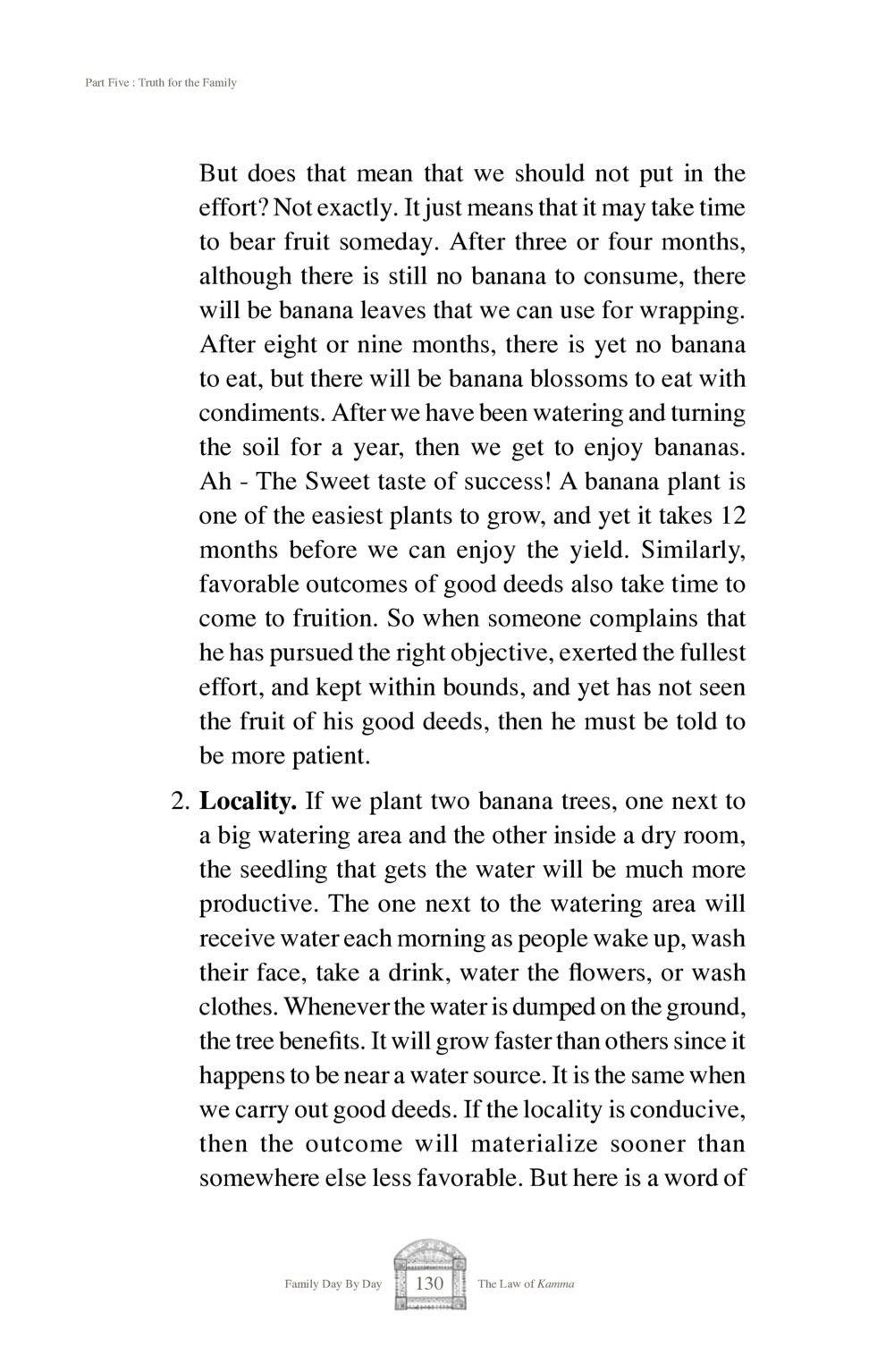Truth for the Family : หน้า 132/216
Family Day By Day : หน้า 132/216 This section discusses the importance of patience and favorable conditions in realizing the outcomes of good deeds, using banana cultivation as a metaphor.
0 ครั้ง

สรุปเนื้อหา
บทที่นี้เน้นความสำคัญของการมีความอดทนและสภาพแวดล้อมที่เอื้อต่อการเห็นผลของการกระทำดี โดยนำการเพาะปลูกกล้วยมาเป็นสัญลักษณ์ เรื่องราวชี้ให้เห็นว่าทุกอย่างต้องใช้เวลา เช่นเดียวกับการเก็บกล้วยที่ต้องรอถึง 12 เดือน ควรมีความอดทนเมื่อผู้คนไม่เห็นผลจากการกระทำที่ดีของตน และสภาพแวดล้อมที่ดีทำให้สามารถเก็บเกี่ยวผลได้เร็วขึ้น.
หัวข้อประเด็น
-ความสำคัญของความอดทน
-สภาพแวดล้อมที่ดี
-การเปรียบเทียบกับการปลูกกล้วย
-ผลของการกระทำดีที่ต้องใช้เวลา
ข้อความต้นฉบับในหน้า
Part Five: Truth for the Family
But does that mean that we should not put in the
effort? Not exactly. It just means that it may take time
to bear fruit someday. After three or four months,
although there is still no banana to consume, there
will be banana leaves that we can use for wrapping.
After eight or nine months, there is yet no banana
to eat, but there will be banana blossoms to eat with
condiments. After we have been watering and turning
the soil for a year, then we get to enjoy bananas.
Ah The Sweet taste of success! A banana plant is
one of the easiest plants to grow, and yet it takes 12
months before we can enjoy the yield. Similarly,
favorable outcomes of good deeds also take time to
come to fruition. So when someone complains that
he has pursued the right objective, exerted the fullest
effort, and kept within bounds, and yet has not seen
the fruit of his good deeds, then he must be told to
be more patient.
2. Locality. If we plant two banana trees, one next to
a big watering area and the other inside a dry room,
the seedling that gets the water will be much more
productive. The one next to the watering area will
receive water each morning as people wake up, wash
their face, take a drink, water the flowers, or wash
clothes. Whenever the water is dumped on the ground,
the tree benefits. It will grow faster than others since it
happens to be near a water source. It is the same when
we carry out good deeds. If the locality is conducive,
then the outcome will materialize sooner than
somewhere else less favorable. But here is a word of
Family Day By Day 130
The Law of Kamma
หน้าหนังสือทั้งหมด

1

2

3

4

5

6

7

8

9

10

11

12

13

14

15

16

17

18

19

20

21

22

23

24

25

26

27

28

29

30

31

32

33

34

35

36

37

38

39

40

41

42

43

44

45

46

47

48

49

50

51

52

53

54

55

56

57

58

59

60

61

62

63

64

65

66

67

68

69

70

71

72

73

74

75

76

77

78

79

80

81

82

83

84

85

86

87

88

89

90

91

92

93

94

95

96

97

98

99

100

101

102

103

104

105

106

107

108

109

110

111

112

113

114

115

116

117

118

119

120

121

122

123

124

125

126

127

128

129

130

131

132

133

134

135

136

137

138

139

140

141

142

143

144

145

146

147

148

149

150

151

152

153

154

155

156

157

158

159

160

161

162

163

164

165

166

167

168

169

170

171

172

173

174

175

176

177

178

179

180

181

182

183

184

185

186

187

188

189

190

191

192

193

194

195

196

197

198

199

200

201

202

203

204

205

206

207

208

209

210

211

212

213

214

215

216
หนังสือที่เกี่ยวข้อง
Load More
